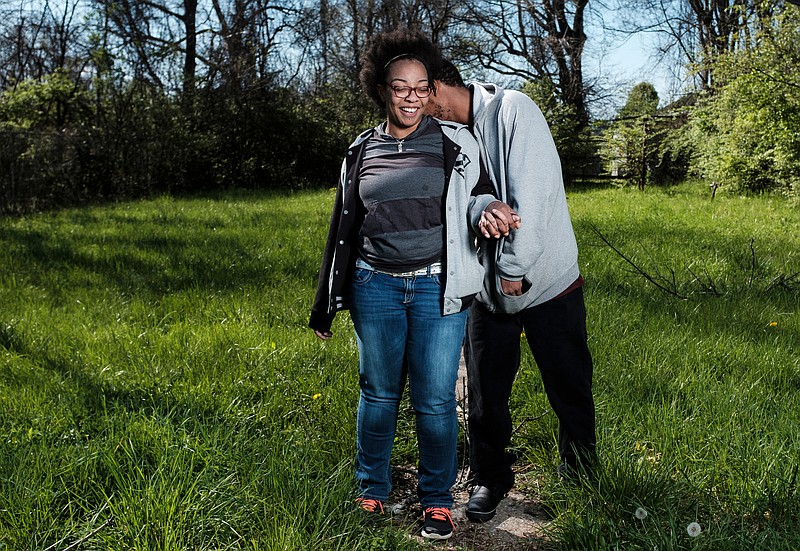When Cora Lanier and her son, Jumaane, rallied their East Chattanooga neighborhood a few years ago and helped form the Boyce Station Neighborhood Association, they were worried.
All across the city, longtime Chattanooga families were finding themselves in a housing crisis, said Lanier, a former program director at Girls Inc. who has been a volunteer community organizer in East Chattanooga since 2001.
Property owners in neighborhoods in and around downtown were watching their property tax bills escalate, but many couldn't increase their income to cover the jump. Others were displaced when landlords sold their rental property to developers. Others were forced to move when they couldn't afford their skyrocketing rent. And thanks to increasing property values, nearby affordable housing was nearly impossible to find.
"Vulnerable families are trying to hold on, but they are being pushed further and further out," she said.
The wave of gentrification, rippling from Chattanooga's downtown renaissance and population boom, was coming, Lanier believed. Homeowners in East Chattanooga were receiving letters and visits from real estate agents offering to help them sell, and some neighborhood leaders in East Chattanooga were beginning to notice an exodus of legacy homeowners and an increase in short-term vacation rentals.
"Everything that comes available in our five streets, the same couple buys the property and puts it up as an Airbnb. The traditional neighborhood, it is no longer there," Marvene Noel, a homeowner in Orchard Knob, shared at a recent meeting of East Chattanooga neighborhood leaders.
Lanier feared that the struggling, but close-knit, single-family community she had loved and lived in for 30 years would be washed away.
Blight was a problem. Boyce Station, which is bordered by Glass Farms and Avondale, was overrun with vacant or unkempt lots - 22 percent of neighborhood lots are undeveloped, according to parcel data, and 18 are owned by Hamilton County and overseen by the City of Chattanooga due to back taxes. The neighborhood's visible deterioration made it ripe for real estate speculation, residents believed.
Chattanooga was drawing an increasing number of upper- and upper- middle class urbanites fleeing the soaring costs and congestion of larger cities. So demand for high-end rentals, condos and homes near the city center was booming.
Lanier and other Boyce Station residents worried that Chattanooga would experience the same growth pattern of other cities, where cheaply buying into undervalued working-class neighborhoods near a growing downtown paid off. In city after city, the pattern was clear. Eventually, vulnerable neighborhoods succumbed to market forces.
In fact, since 2008, the number of owners with out-of-state mailing addresses in Boyce Station had increased by 16.4 percent, according to parcel data collected and analyzed at the United Way of Greater Chattanooga per the association's request.
"Every resident - down to each child - deserves the opportunity to thrive where they live," said Dr. Eileen Rehberg, director of data analysis and strategy at the United Way of Greater Chattanooga. "Neighborhood stability is worth fighting for, and it's gained through collaboration with residents leading the way."
So Lanier and her neighbors began strategizing ways to combat the forces that be.
As the group began discussing ways to improve the existing neighborhood, one thing seemed clear: They had to increase the number of working-class homeowners in Boyce Station, said Lanier, the association vice president.
Homeowners took far better care of their property than absentee landlords and renters, and they could work together to maintain the character of Boyce Station in the years to come, the group agreed.
And when one of the association members, Lynesha Flanigan, a 32-year-old Boyce Station renter who lives with her husband and five children and works at a data management firm, shared her dream of becoming a homeowner, a lightbulb went off, Lanier said. The solution to the neighborhood's problem was already in the neighborhood.
There were renters in Boyce Station like Flanigan with stable jobs who could afford a modest mortgage. Yet, they were isolated from the relationships and resources that could help them become homeowners. They needed a support system to be successful.
So Lanier and others in the group stepped up. They wrapped around Flanigan, leveraging what social capital they had, and quickly the passion project gained momentum.
First, Dr. Everlena M. Holmes, a volunteer community organizer who has been working with East Chattanooga neighborhood leaders to strengthen neighborhood associations, notified the group that a bunch of property in Boyce Station was about to be up for grabs.
Hamilton County owns hundreds of vacant lots and homes seized due to back taxes and gets rid of them two ways. An auction is held at the county courthouse where the properties are sold to the highest bidder or they are put through a bid process, overseen by the City of Chattanooga, which mandates the properties be used for "low- or moderate-income housing."
And several of the lots coming up for bid were right in Boyce Station.
Rehberg, at the United Way, connected Lanier to a developer around the same time.
Reginald Jordan, a former Howard High School teacher, whose company, Infinite Construction, is building an affordable housing development for seniors in Alton Park, attended a neighborhood association meeting to hear the group's vision and left in tears, he said.
"I was overcome with so much emotion. I have seen how people have been misplaced by progress," said Jordan, who also works with his church, World Restoration Center, to build affordable homes for families working toward financial stability through home ownership. "There was someone else who saw the need for true affordable housing. They wanted to do the same thing I am doing.
"I want to help the people that society says shouldn't own a home."
Jordan then used his own money to put a bid in with the city for one of the properties on Taylor Street that had been listed in the request for proposals (RFP) that ran in the public notice published in the newspaper. The minimum bid had to be enough to pay whatever back taxes were connected to the property.
In the meantime, Flanigan began working with the nonprofit Chattanooga Neighborhood Enterprises to get educated on homeownership, improve her credit and pre-qualify for a home loan.
Once they had the land and the loan, Jordan's plan was to build Flanigan a $100,000 home that would lower her housing costs by several hundred dollars a month and give her a chance to build equity.
They waited weeks before they heard back from the city, which appoints a committee to score each proposal on four things: the quality of the developer; the project details; readiness to proceed; and the project's value to the city, that is, its affordability.
Lanier, who felt overwhelmed by the whole process at times, said she couldn't believe when Jonathan Butler, the city manager for neighborhood services and development, called last week and told her that Jordan won with a bid for $500. Still, the city purchasing department has not announced the final list of successful bidders. That list is expected to be announced this week, city officials said.
"I couldn't contain myself when I got the news," Flanigan said. "I am proud to have my community behind me to help me fulfill what I thought was an impossible dream."
The house they hope to build on Taylor Street is just a beginning, said Lanier, who has been working hard to find new candidates for homeownership in the neighborhood, as well as vacant lots that can be developed by builders like Jordan.
And in February, Lanier made a bold move toward that end.
Thanks to Rehberg's research at the United Way, Lanier knew the addresses of all the property owners in Boyce Station, and one of the neighborhood's representatives on the Chattanooga City Council, Demetrus Coonrod, who has been working with the association to address blight, suggested Lanier send a letter to all the property owners, asking if anyone was willing to donate property.
"Others may look at our neighborhood value in dollars only," Lanier wrote in a letter she mailed to 155 addresses. "Boyce Station residents see the neighborhood as an opportunity to build a stable foundation through access to home ownership. As a leader of the Boyce Station Neighborhood Association, I am asking you to consider your property, an empty lot, as an investment that builds on opportunity for families to invest in a home of their own."
Coonrod, who plans to host a free homebuyer workshop at Greater Second Missionary Baptist Church on April 14, said she is thrilled about the neighborhood's efforts. Real estate is a sound investment that offers wealth-building opportunities to working class families, she said, and upping home ownership also promises to revive neighborhoods such as Boyce Station.
"Applying pressure to absentee landlords to invest in their property, sell or donate said property sends a message that we are no longer settling for abandonment," said Coonrod.
Donna Williams, head of the city's office of economic and community development, also said she supports the effort.
"Reginald Jordan is a solid guy. His prices tend to be affordable," she said. "It's fantastic when neighborhood advocates can connect with experienced developers who are willing to invest the financial resources they have to build in these neighborhoods."
So far, Lanier has received 11 responses to the letter.
Three people are willing to sell to Jordan for a reasonable price, and two owners are willing to donate.
"You can't make this up. It's amazing!" Lanier said. "It has given us hope.
"Before, we saw gentrification coming like a freight train and felt that we had no control. This vision gives us a foundation for control. Now, when the freight train comes, and it'll come, it'll have to navigate what is already here. You can't just push us out. We will be stronger. We will have homes."
Contact staff writer Joan McClane at jmcclane@timesfreepress.com or 423-757-6601.

